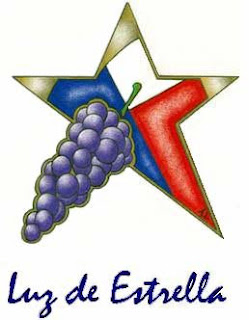TTAB FInds "LUZ DE ESTRELLA" and "STARLITE WINERY" Confusingly Similar for Wine
Applying the doctrine of foreign equivalents to Applicant's mark LUZ DE ESTRELLA & Design (shown immediately below), the Board found the mark likely to cause confusion with the registered mark STARLITE VINEYARDS ["VINEYARDS" disclaimed], both for wine. The differences in sound and appearance between the marks were outweighed by the "strong similarity in connotations and commercial impressions." In re Armstrong Vineyards & Winery, Serial No. 78849329 (May 30, 2008) [not precedential].

With the goods identical, the degree of similarity necessary to support a likelihood of confusion finding is diminished. Applicant agreed that foreign terms from common languages are usually translated into English, but it argued that the average American consumer would not translate the Spanish wording in its mark. The Board, however, saw nothing in the record to support this argument.
Applicant next asserted that the PTO had misapplied the CAFC's ruling in Palm Bay, but the Board disagreed. As the TTAB ruled in In re Spirits Int'l N.V., 86 USPQ2d 1078 (TTAB 2008) [TTABlogged here], the court in Palm Bay did not address the definition of "ordinary American purchaser." The long-established case law holds that the relevant consumer, for purposes of the doctrine of foreign equivalents, is the ordinary U.S. purchaser who also "speaks or understands" the foreign language. [TTABlog note: the CAFC's ruling in Palm Bay created a certain amount of confusion on this point].
Alternatively, Applicant contended that even if the average American consumer would stop and translate the term "Luz de Estrella," the translation does not match or denote the cited mark STARLITE VINEYARDS -- this despite the fact that Applicant had supplied the translation "Star light." "Starlite," argued Applicant, is a coined term and so the Spanish-speaking consumer wound not understand STARLITE as the equivalent of "Luz de Estrella." The Board, however, found Examining Attorney Brian Neville to be correct in noting that "Starlite" and "Luz de Estrella"/"Star light" have the same literal connotation.
The Board agreed with the "quite rational" position taken by the PTO that more weight is to be accorded to the literal portions of the marks. Moreover,
"'Star Light' and 'Starlite Vineyards' will have exactly the same connotation for registrant's wines and for applicant's wines, as identified. The 'Star Light' connotation of applicant's composite mark is accentuated by the applicant's choice of a 'star' design, and having a bunch of grapes replacing one point of the star suggests a 'vineyard.'"
After weighing "all the types of similarities and dissimilarities of the marks," the Board found that this factor too weighs in favor of the PTO.
The Board therefore affirmed the refusal to register.
TTABlog note: The problem I have with Applicant's argument that a Spanish-speaking consumer would not understand "Starlite" as the equivalent of "Luz de Estrella" is that the relevant person is supposed to be knowledgeable in both English and Spanish, not just Spanish. That person would understand that "Starlite" and "Star light" are equivalent terms, wouldn't she?
PS: The Spirits International decision is now on appeal to the CAFC.
Text Copyright John L. Welch 2008.




0 Comments:
Post a Comment
<< Home